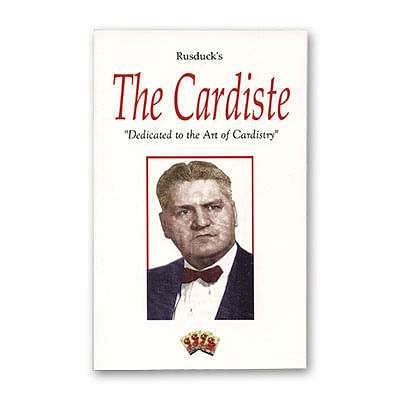The Cardiste by J. Russell Duck
Reviewed by Jamy Ian Swiss (originally published in Genii September, 2006)

Here is an unarguably timely volume that will be of interest to many contemporary cardicians—certainly including fans of Juan Tamariz's Mnemonica stack and that happened to be first produced in 1957.
- Russell Duck was a policeman and amateur magician who, in 1957, using the pseudonym "Rusduck," debuted a homemade mimeographed (does anyone remember that word?) circular for card workers entitled The Cardiste. The contents reflect Rusduck's extremely particular tastes in card magic, namely, "card table routines for which playing cards were originated, designed and intended." In other words, Cardiste offers poker deals, bridge deals, and similarly related tabled and dealing plots, while the editor/publisher made every effort to avoid including examples of the dreaded (to him) "You Lose It I Find It" effects, which he believed to be a kind of "monotonous monstrosity," as he scolded in the opening pages of the first issue.
Whether or not one agrees with this assessment of card location plots (and I most assuredly do not), Mr. Rusduck remained fairly true to his word. In every issue he explored countless variations on his themes which in turn resulted in noteworthy excursions into the subjects of stacked decks in general and the Faro Shuffle in particular, still a rather exotic technique at the time. Rusduck used full-deck stacks not so much as memorized decks are used today, but rather as ingenious methodology for frequently ingenious, and sometimes potentially entertaining, sequential effects, for example as repeat poker deals, or decks that could spell to any named card.
Two items in particular that saw their debut in the pages of Cardiste have achieved lasting presence in the world of memorized deck work. In Issue No.2, Rusduck published his "Zens-ational," a stack of 13 cards that can produce any poker hand named by the spectator. This "Any Poker Hand Called For" (based on an earlier idea of Mike Zens) is a built-in feature of Simon Aronson's popular memorized deck stack.
Even more significant was an item described in the premiere issue, Rusduck's Stay-Stack System. This "mirrored deck" system possesses a litany of unusual features that interplay elegantly with the Faro Shuffle and is a built-in feature of Tamariz's Mnemonica stack. Users of Mnemonica are encouraged to consult Cardiste to follow and appreciate Rusduck's discovery and exploration of the system, which was independently reinvented by Alex Elmsley within a year of Rusduck's discovery, as recounted by author Stephen Minch in Volume of The Collected Works of Alex Elmsley. Elmsley subsequently contributed some of his ideas to Cardiste, including this comment: Our tastes in magic obviously differ. I like take-a-card tricks ...."
"Russ" Duck died in 1959, having completed 11 issues of Cardiste. Eventually the accumulated content for Issue No.12 was gathered and published in the March 1960 issue of Ibidem. In 1969 Gene Shelley collected a new set of contributions from the likes of Bruce Cervon, Derek Dingle, Larry Jennings, Charlie Miller, Martin Nash, John Thompson, and several others, and published these as Issue No.13 in his complete reprint edition of Cardiste. This current reprint, an edition that will be numbered up through 275 copies, essentially comprises a re-edited reprint of the 1969 Shelley edition and also adds two more items, one each from Don Alan and Eddie Fields, that provide two examples of routines that incorporate practically managed deck switches. Considering the asking price I would have preferred a tad more production value: the covers are very light card stock; there is an alphabetized index at the front, but no table of contents delineating the individual issues by content; there are no running headers or footers to help keep the reader located. But everything old is new again, and fans of stacked decks and Faro Shuffles will find no better example than in the ground-breaking work of J. Russell Duck who, in 1951 in the pages of The Phoenix, in fact coined the term "cardiste." Cardistes, one and all take note!

